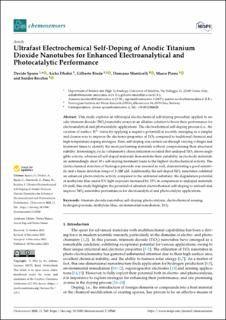Ultrafast Electrochemical Self-Doping of Anodic Titanium Dioxide Nanotubes for Enhanced Electroanalytical and Photocatalytic Performance
Peer reviewed, Journal article
Published version
Permanent lenke
https://hdl.handle.net/11250/3113586Utgivelsesdato
2023Metadata
Vis full innførselSamlinger
- Publikasjoner fra Cristin - NIVA [2149]
- Scientific publications [1172]
Sammendrag
This study explores an ultrarapid electrochemical self-doping procedure applied to anodic titanium dioxide (TiO2) nanotube arrays in an alkaline solution to boost their performance for electroanalytical and photocatalytic applications. The electrochemical self-doping process (i.e., the creation of surface Ti3+ states by applying a negative potential) is recently emerging as a simpler and cleaner way to improve the electronic properties of TiO2 compared to traditional chemical and high-temperature doping strategies. Here, self-doping was carried out through varying voltages and treatment times to identify the most performing materials without compromising their structural stability. Interestingly, cyclic voltammetry characterization revealed that undoped TiO2 shows negligible activity, whereas all self-doped materials demonstrate their suitability as electrode materials: an outstandingly short 10 s self-doping treatment leads to the highest electrochemical activity. The electrochemical detection of hydrogen peroxide was assessed as well, demonstrating a good sensitivity and a linear detection range of 3–200 µM. Additionally, the self-doped TiO2 nanotubes exhibited an enhanced photocatalytic activity compared to the untreated substrate: the degradation potential of methylene blue under UV light exposure increased by 25% in comparison to undoped materials. Overall, this study highlights the potential of ultrafast electrochemical self-doping to unleash and improve TiO2 nanotubes performances for electroanalytical and photocatalytic applications.

